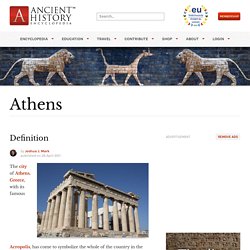

The British Museum. Rise of City-States: Athens and Sparta. The Acropolis played an integral role in Athenian life.

This hilltop not only housed the famous Parthenon, but it also included temples, theaters, and other public buildings that enhanced Athenian culture. Geography plays a critical role in shaping civilizations, and this is particularly true of ancient Greece. The Greek peninsula has two distinctive geographic features that influenced the development of Greek society. First, Greece has easy access to water. The land contains countless scattered islands, deep harbors, and a network of small rivers. Second, Greece's mountainous terrain led to the development of the polis (city-state), beginning about 750 B.C.E. Athens: The Think Tank Life was not easy for Athenian women. The city-state of Athens was the birthplace of many significant ideas. Athenians placed a heavy emphasis on the arts, architecture, and literature. Athenians also enjoyed a democratic form of government in which some of the people shared power.
Sparta: Military Might. Athens. The city of Athens, Greece, with its famous Acropolis, has come to symbolize the whole of the country in the popular imagination, and not without cause.

Athens began as a small, Mycenaen community and grew to become a city that, at its height, epitomized the best of Greek virtues and enjoyed such prestige that the Spartans refused to sack the city or enslave the citizens, even after Athens' defeat in the Peloponnesian War. This set a model that would be followed by future conquerors who would defeat Athens but not destroy it. Early Settlement Evidence of human habitation on the Acropolis and, below, in the area around the Agora, dates back clearly as far as 5000 BCE and, probably, as early as 7000 BCE. According to legend, the Athenian King Cecrops named the city after himself but the gods, seeing how beautiful it was, felt it deserved an immortal name. Primary History - Ancient Greeks - Athens. Athenian Democracy. Athens in the 5th to 4th century BCE had an extraordinary system of government: democracy.

Under this system, all male citizens had equal political rights, freedom of speech, and the opportunity to participate directly in the political arena. Further, not only did citizens participate in a direct democracy whereby they themselves made the decisions by which they lived, but they also actively served in the institutions that governed them, and so they directly controlled all parts of the political process. Ancient Sources Other city-states had, at one time or another, systems of democracy, notably Argos, Syracuse, Rhodes, and Erythrai. In addition, sometimes even oligarchic systems could involve a high degree of political equality, but the Athenian version, starting from c. 460 BCE and ending c. 320 BCE and involving all male citizens, was certainly the most developed. The word democracy (dēmokratia) derives from dēmos, which refers to the entire citizen body: the People.
Conclusion. Sparta. Sparta was one of the most important Greek city-states throughout the Archaic and Classical periods and was famous for its military prowess.

The professional and well-trained Spartan hoplites with their distinctive red cloaks, long hair, and lambda-emblazoned shields were probably the best and most feared fighters in Greece, fighting with distinction at such key battles as Thermopylae and Plataea in the early 5th century BCE. Bred for Battle—Understanding Ancient Sparta’s Military Machine. This story appears in the November/December 2016 issue of National Geographic History magazine.

Sparta’s enemies, when facing the intimidating Spartan forces, would see a wall of shields, bristling with lances, inexorably bearing down on them—not to the beat of drums, but as the Greek historian Thucydides explains, “to the music of many ute-players, a standing institution in their army, which has nothing to do with religion, but is meant to make them advance evenly, stepping in time, without breaking their order.” Little remains of the ancient city of Sparta, capital of the Laconia region, situated on the Peloponnesus peninsula in modern Greece, but the impact of its unique culture is impossible to ignore.
Unlike Athens to the north, Sparta was famed for its austerity—its “spartan” character—was, and is, proverbial. Athens and Sparta Founded around the ninth century B.C., Sparta’s kings oversaw a society with little interest in intellectual and artistic pursuits beyond patriotic poetry. Sparta - The British Museum.